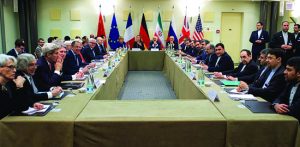×


We have detected your country as:
Please click here to go to the USA website or select another country from the dropdown list.
by: Ilse Posselt, Bridges for Peace

P5+1 and EU negotiate with Iran in Lausanne
On 17 January 2016, Iran’s once illegal nuclear plan became legit. It happened after nearly two years of negotiations between the Islamic Republic of Iran and heads of the P5+1 (US, China, France, UK, Russia and Germany).
The Iran deal was flaunted as a success story in restricting Tehran’s nuclear activities to peaceful purposes in exchange for an end to the sanctions crippling the nation’s economy. Yet less than two months after the deal was sealed, it appears that the minds of those in the troubled Middle Eastern region are anything but at ease. In fact, the controversial Iran deal seems to have done the exact opposite.

Moshe Ya’alon, Defense Minister
(Ariel Harmoni/Ministry of Defense)
Speaking at a security conference in Munich, Israel’s Defense Minister Moshe Ya’alon told his peers that the Jewish state has noticed Iran’s neighbors gearing up to arm themselves with nuclear weapons, “because they are unwilling to sit quietly with a nuclear Iran, or an Iran on the verge of a nuclear bomb.”
Speaking to The Jerusalem Post, Dr. Emily Landau, Head of the Arms Control Program at the Institute for National Security Studies in Tel Aviv, commented on Ya’alon’s remarks, stating that the Iran deal has increased the motivation for a number of Arab states to embark on the nuclear path.
“The three states that are often mentioned as those who would have the strongest motivation to become nuclear states if Iran were to cross the threshold are Saudi Arabia, Egypt and Turkey,” Landau told The Jerusalem Post. “Saudi Arabia has made some strong statements about its intent to have whatever capabilities Iran does.”
“We periodically hear about certain states in the region considering, and also signing deals with states that can supply them with what they need,” Landau said. Russia is one of the countries that has both the expertise and the means to assist any country in its nuclear endeavors—at the right price, of course.
According to Russia Today, Rosatom, the Russian state atomic energy corporation is set for an estimated surge in foreign orders up to $190 billion over the next five years.
All logos and trademarks in this site are property of their respective owner. All other materials are property of Bridges for Peace. Copyright © 2024.
Website Site Design by J-Town Internet Services Ltd. - Based in Jerusalem and Serving the World.